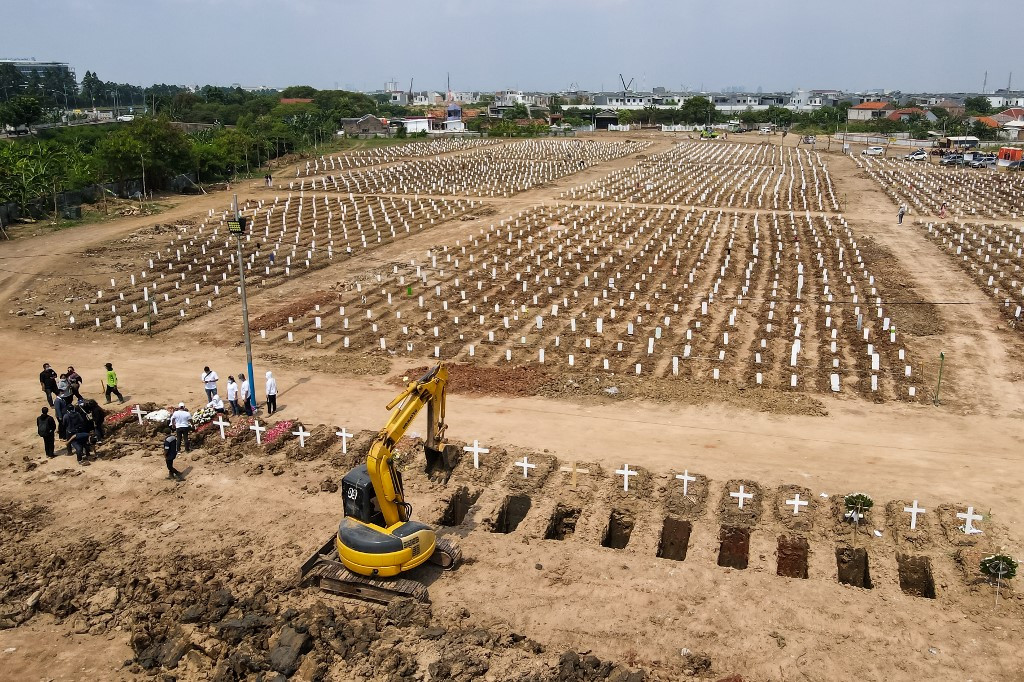Popular Reads
Top Results
Can't find what you're looking for?
View all search resultsPopular Reads
Top Results
Can't find what you're looking for?
View all search resultsEarly election campaigning draws ire in pandemic-stricken Indonesia
Change text size
Gift Premium Articles
to Anyone
W
hile the nation’s elections are still three years away, some prospective candidates seem to be seeking a head start as campaign billboards pop up in major cities, a move that has been criticized as tone-deaf amid the country’s continuing struggles with COVID-19.
Both Golkar Party chairman Airlangga Hartarto and Indonesian Democratic Party of Struggle (PDI-P) politician Puan Maharani, whose electability and popularity in national polls remain low despite their elite standing in two of the country’s biggest political parties, have appeared on such roadside media.
Painted in the party’s distinctive yellow color, billboards with portraits of Airlangga and stamped with the year 2024 – the next election year – have appeared in Central Java, East Java, South Sulawesi, Bogor and Bekasi over the past few weeks. They bear the slogan “working for Indonesia”.
Airlangga, in his capacity as the coordinating economic minister, is responsible for leading efforts to curb the spread of the highly transmissible Delta variant of the coronavirus outside Java and Bali.
Red billboards depicting Puan, meanwhile, carry the slogan “the flapping of the wings of diversity”. They have been found in East Java, Central Java and Yogyakarta.
Other posters feature Democratic Party chairman Agus Harimurti Yudhoyono, National Awakening Party (PKB) chairman Muhaimin Iskandar and Gerindra Party chairman Prabowo Subianto.
The early campaigning, however, has drawn anger and ridicule on social media, mostly directed at Puan and Airlangga, who were seen as chasing popularity and their own political ambitions while many Indonesians suffered amid the COVID-19 crisis.
Observers have called the efforts “ineffective” and “insensitive”.
“The response has not been exciting. The public strongly feel that those who are campaigning are insensitive and lacking a sense of propriety,” political communications analyst Adi Kunto Wibowo said.
Party pride?
While the PDI-P has not determined who will get its nomination for the 2024 presidential elections, a number of prominent cadres pushed Puan to enter the race in June.
But the party has denied that the billboards were meant to promote Puan as a prospective presidential candidate, saying they were instead intended to showcase “pride” in the House of Representatives speaker.
“Puan appeared in her capacity as House speaker – the first woman to serve in the position in Indonesia’s history,” PDI-P politician Hendrawan Supratikno told The Jakarta Post on Friday.
PDI-P central board executive in charge of electoral campaigns Bambang Wuryanto said the idea first emerged in a faction meeting at the House and was funded voluntarily, according to media reports.
In a letter sent to party members, a copy of which was obtained by the Post on Thursday, PDI-P chairwoman Megawati Soekarno Putri instructed all cadres to be “disciplined” and refrain from talking about the presidential election, or else they would be subject to “disciplinary sanctions”.
Hendrawan confirmed that the letter was issued by the party’s executive office but denied that it had anything to do with speculation that the party would nominate Puan.
Meanwhile, Golkar deputy chairman Ahmad Doli said on Wednesday that the billboard was part of Golkar’s efforts to promote Airlangga as a 2024 presidential candidate because his popularity was lagging behind, Antara reported.
Airlangga’s poor electability polling, another Golkar politician said, was due to the fact that he had never run for president.
“Airlangga has never participated in such a political contest, like those who have better electability. Our party members are just starting to introduce Airlangga [to the public],” Golkar lawmaker and East Java office head Muhammad Sarmuji told the Post.
Electoral underdogs
A Charta Politika poll released on Thursday found that both Puan and Airlangga lagged far behind eight other potential presidential contenders in electability.
Of the 1,200 respondents from throughout the country who were polled from July 12 to 20 – before Airlangga’s billboards appeared but while Puan’s were on display – only 1.4 percent said they would vote for Puan, while 1 percent said they would vote for Airlangga.
Meanwhile, Central Java Governor Ganjar Pranowo – a member of the PDI-P whose popularity has irked party elites and Puan – emerged as the strongest potential candidate with 20.6 percent of respondents saying they would vote for him. He was followed by Jakarta Governor Anies Baswedan with 17.8 percent and two-time Gerindra candidate for president Prabowo with 17.5 percent.
Yunarto Wijaya of Charta Politika noted that erecting billboards in the midst of a crisis had boosted potential candidates’ electability and that such strategies would only work under normal conditions.
“Elites who use billions of cash just to fulfill their narcissistic needs in times of crisis will only create a boomerang effect [in likeability],” he said.
Analyst Ujang Komarudin said providing cash and noncash assistance to people in need would have given candidates a better chance of boosting their electability.










